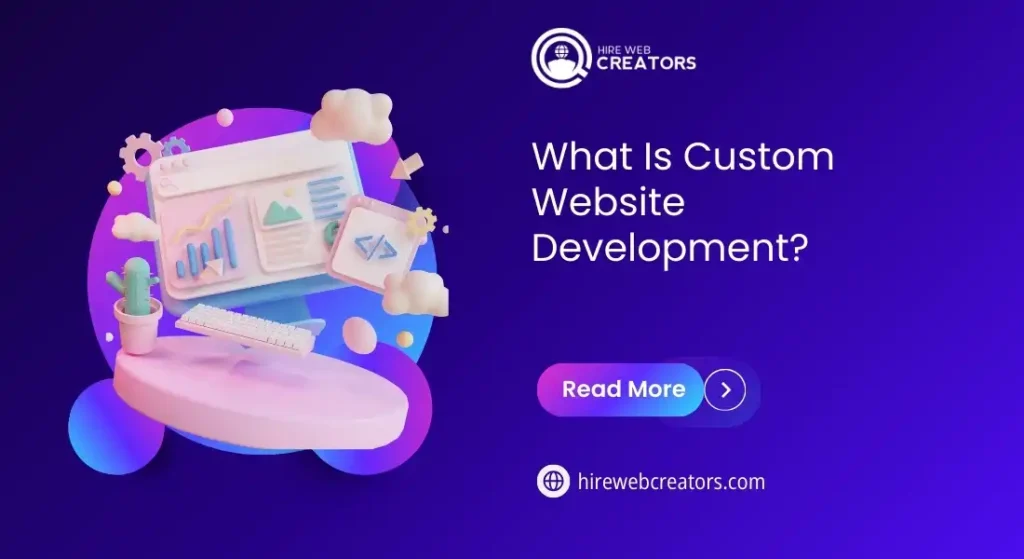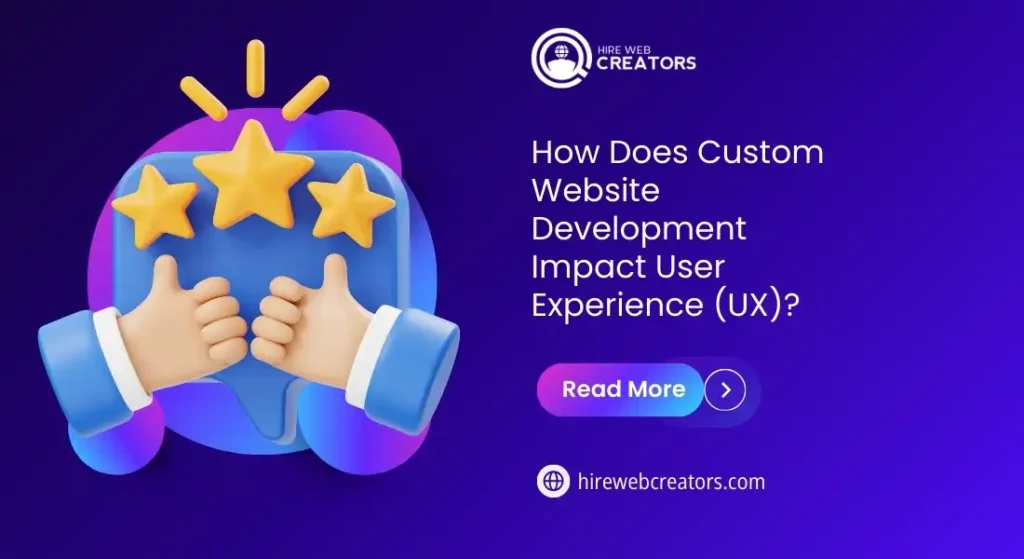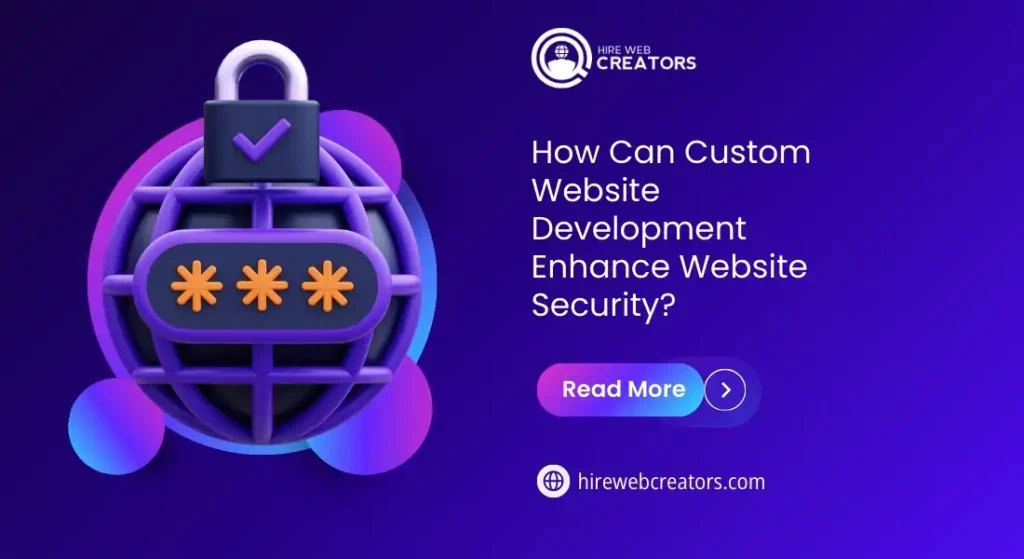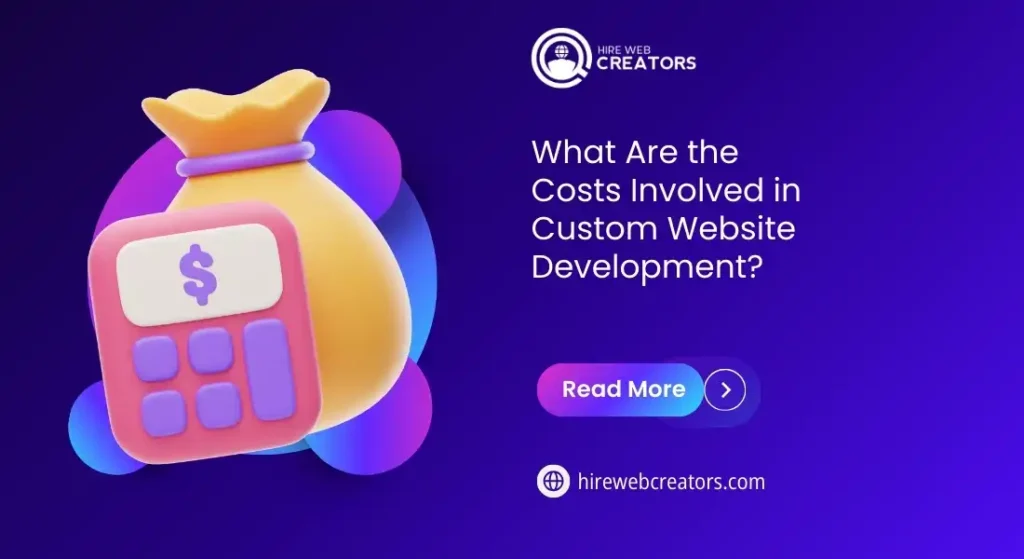Grow your business with custom website development designed specifically for your goals. Explore personalized solutions for enhanced functionality and performance. A well-designed and tailored website not only strengthens your brand but also enhances user experience, improves security, and ensures scalability. In this comprehensive guide, we will delve into the critical aspects of custom website development and how it can help businesses achieve their objectives.
Custom website development goes beyond pre-built templates and cookie-cutter solutions. It provides businesses with complete control over the look, functionality, scalability, and performance of their websites. From e-commerce to complex web applications, a custom website is designed with your specific needs in mind, ensuring a solution that fits your business perfectly.
Table of Contents
What Is Custom Website Development?
Custom website development refers to the creation of a unique website designed and built from scratch according to the specific needs, goals, and preferences of a business. Unlike pre-made templates or drag-and-drop website builders, custom websites are entirely tailored to reflect the brand’s identity and provide the functionality needed to drive business success.

From design aesthetics to back-end coding, custom website development allows businesses to create digital experiences that are not only visually appealing but also highly functional, secure, and scalable. For instance, businesses like those on Fiverr offer specialized services in custom website development, helping clients build sites that stand out in a crowded marketplace.
Key characteristics of custom website development include:
- Tailored Design: Custom development allows for a completely personalized look and feel that aligns with your brand’s identity.
- Bespoke Features: Whether you need a complex e-commerce setup or a simple portfolio site, custom development ensures the inclusion of all necessary features.
- Scalability: As your business grows, your website can be easily adapted, adding new functionalities and features without compromising performance.
- Enhanced Security: A custom site is less reliant on third-party plugins, reducing the risk of vulnerabilities.
By opting for custom website development, businesses can ensure their website meets today’s needs and is adaptable to future challenges and opportunities.
Why Should You Choose Custom Website Development Over Templates?
When deciding between custom website development and using a pre-designed template, it’s essential to consider your business’s long-term goals. Templates offer a quick, inexpensive solution, but they come with limitations in design flexibility, SEO optimization, and scalability. Custom website development, on the other hand, provides a robust and unique digital foundation tailored specifically to your business.
Advantages of Custom Website Development:
- Uniqueness: Templates are used by thousands of websites across various industries, making it difficult for your site to stand out. Custom development gives you full control over the design, ensuring your site reflects your brand’s unique personality and values.
- Flexibility: Custom websites offer the freedom to add any feature or functionality your business may need, without the constraints that come with a template. For instance, an e-commerce site may require specific checkout processes, while a portfolio site might need advanced gallery functions.
- Scalability: As your business grows, a custom website can be easily adapted to handle increased traffic, more content, and new features, whereas templates often become cumbersome when trying to scale.
- Better Performance and SEO: Custom websites are coded with performance and SEO in mind, ensuring faster load times and higher search engine rankings.
Templates, while tempting for small businesses or startups due to their cost-effectiveness, are often not built for long-term success. Custom website development, although a larger upfront investment, provides a better ROI by delivering a website that grows with your business and helps you stand out from the competition.
How Does Custom Website Development Impact User Experience (UX)?
User experience (UX) is a critical factor in determining how effectively your website engages visitors and encourages them to take action. A website with poor UX will not only frustrate users but also increase bounce rates and negatively impact conversion rates. Custom website development ensures that UX is at the forefront of your website design, creating a seamless, intuitive, and enjoyable experience for users.

Custom website development impacts UX in the following ways:
- Personalized User Journeys: Custom development allows for the creation of personalized user journeys, guiding visitors through the site based on their preferences and behavior. This can significantly enhance the overall user experience and encourage conversions.
- Optimized Navigation: A custom website is built with user-centric navigation in mind. Whether it’s simplifying the path to checkout or making it easy to access critical information, custom navigation ensures a fluid experience across the entire site.
- Responsive Design: Custom websites are designed to be responsive, ensuring that the layout and content automatically adjust to fit any screen size, from desktops to mobile devices. Given that over 50% of web traffic comes from mobile devices, this is a crucial aspect of UX.
- Faster Load Times: A custom website is coded for performance, leading to faster load times. Studies show that even a 1-second delay in load time can result in a 7% reduction in conversions. By reducing page load times, custom websites keep users engaged and decrease the likelihood of them leaving the site prematurely.
With custom website development, businesses can focus on creating a tailored, user-friendly experience that meets the specific needs of their audience. This results in better engagement, higher conversion rates, and an overall more successful online presence.
What Are the Key Benefits of Custom Website Development for SEO?
Search engine optimization (SEO) is a vital aspect of any website’s success, helping businesses attract organic traffic from search engines. Custom website development offers distinct advantages when it comes to optimizing your site for search engines, helping improve visibility, rankings, and ultimately, traffic.
Key SEO Benefits of Custom Website Development:
- Clean Code: Custom websites are coded efficiently, which is crucial for search engine crawling. This clean coding structure helps improve load times, an important factor for both SEO and user experience.
- Optimized Site Structure: With custom development, your site’s structure can be optimized for SEO, including clean URL structures, effective use of headers (H1, H2, etc.), and internal linking strategies that help search engines index your site more effectively.
- Mobile Optimization: Search engines like Google prioritize mobile-friendly sites. A custom website ensures that your site is responsive across all devices, which is not only beneficial for UX but also a significant ranking factor for search engines.
- On-Page SEO Control: Custom development gives you full control over key on-page SEO elements such as meta tags, alt attributes, and schema markup. This enables more precise optimization for your target keywords.
By focusing on SEO from the development phase, custom-built websites are designed to achieve higher search engine rankings, drive more traffic, and provide better user experiences.
How Can Custom Website Development Enhance Website Security?
Security is one of the most important factors for any business website, particularly if you’re handling sensitive customer data or financial transactions. Off-the-shelf templates often rely on third-party plugins and tools, which can introduce vulnerabilities into your website. In contrast, custom website development gives you greater control over your website’s security measures, ensuring that it’s protected against various cyber threats.

Security Benefits of Custom Website Development
Security is one of the most important aspects of any website, particularly when handling sensitive data such as personal information, payment details, or business transactions. In a world where cyber-attacks are becoming increasingly sophisticated, businesses cannot afford to rely on generic security measures. This is where custom website development stands out, offering tailored security solutions that safeguard both the business and its customers.
Unlike template-based websites that often rely on third-party plugins and pre-built tools, custom websites provide complete control over the website’s architecture and security protocols. With custom development, security can be built into every layer of the website, ensuring stronger protection against cyber threats.
Benefits of Custom Website Development for Security:
- Tailored Security Solutions: Custom websites are built with security in mind, allowing developers to implement specific measures that address the unique vulnerabilities and risks of the business. This includes integrating advanced encryption methods, secure payment gateways, and compliance with industry-specific security standards (such as GDPR or PCI-DSS).
- Reduced Reliance on Third-Party Plugins: While plugins can help add functionality to a website, they are also common entry points for hackers. Template-based websites often rely on a multitude of third-party plugins to function, making them more vulnerable to exploitation. In contrast, custom-built websites minimize the need for plugins by incorporating necessary functionalities directly into the site’s code. This reduces the attack surface and minimizes the risk of breaches.
- Regular Security Audits and Updates: With custom website development, you have greater control over security updates and patches. This means that the website can be regularly audited for vulnerabilities, and the development team can implement timely updates to address emerging threats. Businesses can also integrate advanced security protocols like two-factor authentication (2FA), secure file uploads, and encrypted data transfers.
- Protection Against Specific Threats: Every industry has its unique set of risks when it comes to cybersecurity. For instance, e-commerce websites may face threats related to credit card fraud or identity theft, while financial institutions may need to guard against phishing attacks or data breaches. Custom development allows businesses to build security measures tailored to protect against the specific threats they are most likely to encounter.
By incorporating robust security measures at every stage of development, custom website development provides businesses with a much higher level of protection, ensuring that their digital assets remain secure in a rapidly evolving online environment.
What Role Does Custom Website Development Play in Business Scalability?
Scalability is a critical consideration for any growing business. As your company expands, so too will your digital needs. Whether you anticipate increased traffic, additional features, or the integration of new technologies, your website must be able to handle these changes efficiently. Custom website development plays a crucial role in ensuring that your website can scale along with your business without compromising performance or user experience.
- Flexible Architecture: Custom websites are built with scalability in mind. From the outset, developers can create a flexible website architecture that can accommodate additional features and functionalities as your business grows. For example, if you plan to add e-commerce functionality, a blog, or a customer portal in the future, a custom-built website can be designed to integrate these features without requiring a complete overhaul.
- Seamless Performance with Increased Traffic: As your business grows, so too will your website traffic. A custom website can be optimized to handle high traffic volumes without slowing down or crashing. Developers can implement solutions such as load balancing, caching strategies, and optimized databases to ensure that your website remains fast and responsive even during peak traffic periods.
- Cost-Effective in the Long Term: While custom website development may involve a higher initial investment, it often proves more cost-effective in the long term. Template-based websites can become costly as you try to retrofit new features or scale them to meet growing demand. Custom-built websites, however, are designed to grow with your business, allowing you to add new features, pages, or integrations as needed without significant additional costs.
- Third-Party Integrations: As your business grows, you may need to integrate new tools and technologies to improve operational efficiency or enhance customer experience. Custom websites are built to facilitate seamless integration with third-party applications such as CRM systems, marketing automation tools, payment gateways, and more. This ensures that your website remains a central hub for all your digital operations, regardless of how your business evolves.
By focusing on scalability from the start, custom website development ensures that your website remains a valuable asset as your business expands, allowing you to adapt quickly to changing needs without sacrificing performance or security.
How Does Custom Website Development Improve Website Performance?
Website performance is a key determinant of user experience and search engine ranking. In a world where users expect websites to load quickly and operate seamlessly, even minor delays can have a significant impact on user satisfaction and conversion rates. Custom website development gives businesses complete control over the technical aspects of their website, ensuring optimal performance at all times.

- Optimized Code: Custom-built websites use clean, efficient code that is optimized for speed and performance. Unlike template-based websites, which often contain unnecessary code and bloat, custom websites are streamlined for optimal functionality. This reduces page load times and enhances overall performance, resulting in a better user experience and improved SEO rankings.
- Faster Load Times: A fast-loading website is essential for keeping users engaged. Studies show that users are likely to abandon a website if it takes longer than 3 seconds to load. Custom website development allows developers to optimize all aspects of the site, from image compression to server response times, ensuring that the website loads quickly on all devices.
- Improved Responsiveness: With the rise of mobile browsing, websites must perform well across all devices, including desktops, tablets, and smartphones. Custom websites are built with responsive design in mind, ensuring that they automatically adjust to different screen sizes and resolutions. This not only improves user experience but also helps improve search engine rankings, as mobile responsiveness is a key factor in Google’s algorithm.
- Efficient Resource Management: Custom websites are designed to make efficient use of server resources, reducing the likelihood of performance issues during periods of high traffic. Developers can implement caching mechanisms, optimize database queries, and manage server load to ensure that the website remains fast and responsive, even under heavy user loads.
By prioritizing performance from the outset, custom website development ensures that your website not only meets current performance standards but is also capable of adapting to future challenges.
What Should You Expect During the Custom Website Development Process?
The custom website development process involves several stages, each of which is critical to ensuring that the final product meets your business’s needs and objectives. Unlike template-based websites, which can be quickly deployed, custom development takes time and collaboration to deliver a website that is unique, functional, and optimized for success.
- Discovery and Planning: The first stage of custom website development is the discovery and planning phase. This involves working closely with the development team to identify your business’s goals, target audience, and specific requirements. During this phase, developers will gather all the information needed to create a detailed project roadmap, including the site’s structure, features, and design elements.
- Design and Wireframing: Once the planning phase is complete, the development team will begin creating wireframes and design mockups. Wireframes provide a visual representation of the website’s layout and structure, while design mockups focus on the aesthetic aspects of the site. This stage is crucial for ensuring that the website’s design aligns with your brand’s identity and meets user experience goals.
- Development: After the design is approved, the actual development process begins. Developers will start coding the website, focusing on both the front end (the user-facing side) and the back end (the server and database). This is where the website’s functionality is built, including any custom features or integrations that your business requires.
- Testing: Before the website goes live, it will undergo rigorous testing to ensure that it functions correctly and meets all performance, security, and usability standards. This includes testing for browser compatibility, mobile responsiveness, and load times, as well as identifying and fixing any bugs or issues.
- Launch and Maintenance: Once the website has passed all testing, it is ready for launch. The development team will deploy the site to your live server and ensure that everything is working as expected. After launch, ongoing maintenance and updates will be necessary to keep the website running smoothly and securely.
The custom website development process may take longer than using a template, but the result is a high-performing, secure, and scalable website that is tailored to your business’s unique needs.
What Are the Costs Involved in Custom Website Development?
Custom website development is an investment in your business’s future success. While the initial costs may be higher than using a pre-built template, the long-term benefits far outweigh the initial investment. The costs of custom development can vary significantly depending on several factors, including the complexity of the site, the features required, and the level of customization needed.

- Design and Development: The largest portion of the cost for custom website development is typically the design and development phase. This includes the time and resources needed to create a unique design, build custom features, and integrate third-party tools. On average, businesses can expect to pay anywhere from $5,000 to $30,000 or more for a custom-built website, depending on its complexity.
- Additional Features and Integrations: If your website requires advanced features such as e-commerce functionality, customer portals, or complex integrations with other software (e.g., CRM or ERP systems), the cost will increase accordingly. Custom websites are built to accommodate these advanced functionalities, but each additional feature will conclusion
In conclusion, Custom website development provides businesses with a unique opportunity to create a digital presence that is tailored specifically to their needs, goals, and audience. Whether you are a startup looking to establish your brand or a large enterprise seeking advanced features and scalability, custom development offers unparalleled flexibility and control. By opting for a custom-built website, businesses can ensure that their site is optimized for user experience, performance, SEO, security, and scalability from day one.
Investing in custom website development is not just about creating a beautiful site—it’s about building a powerful tool that will help your business grow and adapt to future challenges. As the digital landscape continues to evolve, having a website that is flexible, secure, and aligned with your business goals will be a critical factor in your long-term success.










